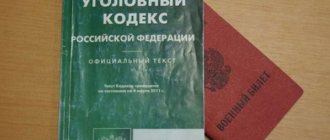Criminal liability for hooliganism and other crimes committed out of hooligan motives
The criminal law of the Russian Federation provides for criminal liability for hooliganism, which is understood as a gross violation of public order, expressing clear disrespect for society.
A person’s obvious disrespect for society is expressed in a deliberate violation of generally accepted norms and rules of behavior, dictated by the desire of the perpetrator to oppose himself to others, to demonstrate a disdainful attitude towards them.
In accordance with Article 213 of the Criminal Code of the Russian Federation (hereinafter referred to as the Criminal Code of the Russian Federation), these actions of a person are qualified as hooliganism, provided that they are committed with the use of weapons or objects used as weapons, or for political, ideological, racial, national or religious reasons. hatred or hostility, as well as on any public transport.
Any material objects, as well as animals that can cause harm to human health, can be recognized as objects used as weapons. This category also includes unloaded weapons that are not suitable for shooting (for example, educational, decorative, toy).
The legislator identifies as a separate group the commission of hooligan acts associated with resistance to a government official or other person protecting public order or suppressing violations in this area. In this case, criminal liability occurs in the form of imprisonment for up to 7 years.
Hooliganism, liability for which is provided for in Article 213 of the Criminal Code of the Russian Federation, should be distinguished from crimes committed by persons with hooligan motives.
Criminal acts committed out of hooligan motives include intentional actions directed against a person’s person or his property, committed without any reason.
Insults, beatings, causing harm to a person’s health, committed in the family, against relatives or acquaintances out of personal hostility towards them, do not constitute hooliganism and are qualified under articles of the Criminal Code of the Russian Federation, providing for liability for crimes against the person.
The most serious type of crime in question is hooliganism with the use of explosives or explosive devices, the commission of which carries a maximum penalty of 8 years in prison.
In accordance with Article 20 of the Criminal Procedure Code of the Russian Federation, persons who have reached the age of sixteen at the time of committing the crime are subject to criminal liability under Part 1 of Article 213 of the Criminal Code of the Russian Federation, and for hooliganism under aggravating circumstances - fourteen years.
Concept of income and expenses
Russian legislation gives us two definitions of income and expenses - tax and accounting.
Clause 2 of PBU No. 10/99 “Expenses of an organization” contains the following definition of expenses: an increase in liabilities and disposal of assets that reduce the capital of a company are expenses. Clause 2 of PBU No. 9/99 “Income of the organization” reveals the concept of income: this is the repayment of obligations and the acquisition of assets that increase the capital of the company. The tax definition of expenses is given in Art. 252 of the Tax Code of the Russian Federation: these are justified and documented expenses of the taxpayer. In turn, income, according to Art. 41 of the Tax Code of the Russian Federation is an economic benefit in cash or in kind that can be assessed.
How to register a violation and punishment for it
The manager decides what measures to take against a negligent employee. To do this, he must have reliable information about the offense, supported by documents (memorandum, act). An approximate procedure for registering an offense and disciplinary action is as follows:
- Notifying the manager about the misconduct. Usually, for this purpose, an act is drawn up in two copies. If there were several episodes, the report must be drawn up for each separately.
- Demanding an explanation from the employee. Within three days, he can draw up an explanatory note indicating the reasons for the offense or refuse explanations. In this case, a corresponding act is drawn up.
- Issuance of an order to take measures (based on available documents). Formed no later than 30 days from the date of violation.
If the employee is absent from the workplace, a requirement to explain the misconduct and a copy of the dismissal order are sent to him by mail, with acknowledgment of receipt.
It is necessary to understand that when issuing a reprimand, and even more so when dismissing, it is very important to comply with the documentary regulations. If the procedure established by law is ignored or violated, the employee will have the opportunity to challenge the decision in court and even regain his labor rights.
The dismissal order must indicate:
- date of termination of the employment contract;
- the rationale for this decision;
- list of supporting documents.
On the last working day, an employee dismissed for a disciplinary offense is issued a labor and (if available) medical record book, a certificate of average salary for the last 3 months (2-NDFL), a form indicating the amount of salary for the last two years (for calculating sick leave), and any necessary certificates and extracts. Also, on the day of dismissal, it is necessary to make a full settlement with the employee. He must receive the amount due to him for days worked, compensation for unused vacation, severance pay, if it is provided for in an employment or collective agreement.
Still have questions?
Fill out the form and our expert will contact you!
List of gross violations of licensing requirements
Amendments were made to the Decree of the Government of the Russian Federation dated October 28, 2014 No. 1110 “On licensing of business activities for the management of apartment buildings” - paragraphs 4(1) and 4(2) were added. The first lists gross violations of licensing requirements. In the second - punishment for committing them.
There are eight gross violations, most of them come into force on September 23. The first is failure to comply with the requirements established by part 2.3 of Art. 161 of the Housing Code of the Russian Federation (violation of the minimum list of works and services), resulting in harm to life or serious harm to the health of citizens. Failure to comply with such requirements must be confirmed by a court decision that has entered into legal force.
The second is the management organization’s failure to carry out hydraulic tests of input units and heating systems, flushing and adjustment of heating systems carried out in order to properly maintain heat supply systems in the house.
The third gross violation of licensing requirements is the failure to conclude work contracts within 30 calendar days from the date of commencement of execution of the management contract:
- for the proper maintenance of VDGO systems in accordance with the requirements established by Decree of the Government of the Russian Federation of May 14, 2013 No. 410;
- for the operation, maintenance and repair of elevators, lifting platforms for the disabled in accordance with the requirements established by Decree of the Government of the Russian Federation dated June 24, 2017 No. 743. An exception is the performance of work on the operation, maintenance and repair of the listed equipment by management organizations independently.
The next gross violation of licensing requirements is failure to fulfill obligations under the management agreement provided for in Part 2 of Art. 162 of the Housing Code of the Russian Federation - failure to conclude, within 30 calendar days from the date of commencement of the execution of the management agreement, contracts with the RSO for the purpose of acquiring utility resources for the maintenance of common property in the apartment building.
The fifth gross violation is that the licensee has a debt recognized by him or confirmed by the court to the RSO in an amount equal to or exceeding two average monthly obligations. This refers to any debt to resource providers. Payment of the said debt does not cancel the violation.
What can be done? We recommend not to sign acts with debt, that is, not to acknowledge debt. If the case goes to court, pay off the debt with current payments until a decision is made. It is imperative to do this before a court decision is made, because the fact of subsequent payment, after recognition of the debt by the court, no longer cancels the violation.
The sixth gross violation of licensing requirements is refusal to transfer, in cases established by law, technical documentation for the house and other documents related to the management of the house, keys to premises of common property, electronic access codes to equipment included in the common property, other technical means and equipment necessary for the operation and management of the house by a new management company, HOA, residential complex or housing cooperative. Or, with direct management, to one of the owners. If the owner’s data is indicated in the OSS decision on choosing a method of managing the house, the documentation is given to him, if not indicated, to any owner.
Evasion from transfer, violation of the order and timing of transfer of technical documentation to the apartment building and other documents, technical means and equipment related to the management of such a house will also be considered a gross violation. So treat the maintenance and storage of technical documentation for your home with all possible attention.
You will flagrantly violate licensing requirements if you do not stop managing an apartment building within 3 days from the date of exclusion of information about such a building from the register of licenses of a constituent entity of the Russian Federation. An exception is the continuation of such activities in accordance with the provisions of Part 3 of Art. 200 of the Housing Code of the Russian Federation, that is, until a new management organization, HOA or residential complex is selected for the house, or the owners enter into agreements with the RSO and agreements for the maintenance and repair of common property.
Another gross violation will be a violation of the requirements for the implementation of emergency dispatch services provided for in paragraph 13 of Rules No. 416. We are talking about the immediate elimination of blockages in the in-house utility drainage system and garbage chutes, the elimination of emergency damage to the in-house utility systems of cold and hot water supply, sewerage and in-house heating and power supply systems.
The comforting news is that this paragraph comes into force on March 1, 2019, since the new requirements for emergency dispatch services, which were approved by Decree of the Government of the Russian Federation dated March 27, 2018 No. 331, come into force on March 1, 2021.
How is the procedure for depriving a management organization of a license carried out?
77970
Types of violations
Labor discipline is a set of norms of behavior, responsibilities, rules of corporate ethics, etc. Among the most common violations are:
- neglect of managerial ethics: subordination, order of actions in the process of managing the production cycle;
- non-compliance with technological and safety standards;
- deviations from the regime: established work schedule, continuity of production, duration of shifts, alternation of work and rest.
A complete list of offenses is given in Article 81 of the Labor Code of the Russian Federation. A gross violation of labor duties by an employee is:
- absenteeism (absence from work without a valid reason for more than 4 hours);
- unauthorized use of time off or vacation (without notifying the employer and drawing up an order);
- refusal to work the required 2 weeks after submitting a resignation letter of one’s own free will;
- non-compliance with the work regime on a business trip;
- appearing at work while intoxicated;
- disclosure of information constituting a secret (state, commercial, personal data, etc.);
- damage, destruction, theft of other people's property;
- non-compliance with labor protection measures: culpability in the occurrence of accidents and disasters, industrial accidents.
An employee who violates labor discipline in this way may be dismissed regardless of position, status and length of service. The exception is pregnant women.
What is included in the concept of public space?
If we are guided by the Code of Administrative Offenses adopted in the Russian Federation, we can safely say that a public place can be any place in which the appearance of individuals is possible.
If you delve deeper into the essence of Article 20.20 of the Code of Administrative Offenses of the Russian Federation, and also read the comments to it, you can identify the criteria by which a public place is determined. These places include:
1. Individuals may appear at any time during the day.
2. There may be a crowd of people during some events.
3. Not privately owned or used individually.
If you make a list of public places, you can add:
1) House and adjacent areas:
- staircase and landing;
- entrance;
- elevator;
- playground for children;
- yard
2) Recreation areas:
- square;
- park area;
- garden plantings;
- areas around lakes, ponds, reservoirs;
- areas along rivers;
- beach.
3) Trade and service organizations:
- shop;
- beauty saloon;
- market;
- shopping mall.
4) Cultural organizations:
- circus;
- theater;
- cinema;
- library.
5) Administrative buildings.
6) Sports facilities:
- stadium;
- pool;
- ice rink.
7) Street.
 Public transport:
Public transport:
- Taxi;
- bus;
- tram;
- metro.
9) Stations:
- airport;
- railway;
- nautical;
- river.
10) Educational institutions:
- kindergarten;
- school;
- institute;
- sport school.
But a large number of lawyers may share such concepts as:
1. “public place”;
2. “public place.”
Example of calculating a fine
Let's consider how a fine is calculated for a gross violation of the rules for accounting for income and expenses.
Example
As part of the on-site inspection conducted by the Federal Tax Service in November 2021, documents were requested from Virage-S LLC. During the inspection, it turned out that the person being inspected was missing a number of documents: for the counterparty LLC Privoz - two invoices for January of the current year, for the counterparty LLC Lenta - one certificate in form KS-3 for March of the current year, for the individual entrepreneur Vasiliev - two invoices for April of this year. In addition, the fact of understating the tax base for profits in the amount of 55,000 rubles was revealed. and income tax not paid to the budget - 11,000 rubles. (RUB 55,000 × 20% [tax rate in 2021]).
These circumstances led to tax authorities imposing penalties of 10,000 rubles on Virazh-S LLC. and 2,200 rub. (RUB 11,000 × 20%). The first fine is for the absence of a primary tax, the second is due to an understatement of the tax base.
In total, the total amount of sanctions imposed on the company amounted to 12,200 rubles.
What else is Resolution No. 1090 about?
In addition to the established list of gross licensing requirements and liability for repeated violation, Resolution No. 1090 is generally interesting for management organizations. It clarifies the list of licensing requirements for managing apartment buildings.
So, now the licensing requirements also include:
- maintaining a register of owners,
- compliance with the obligation to begin execution of the management agreement from the date of amendments to the register of licenses of the entity in connection with the conclusion of the management agreement,
- compliance with Part 6 of Art. 198 Housing Code of the Russian Federation. It states that the exclusion of information about apartment buildings from the register of licenses is grounds for the licensee to terminate the activities of managing such a house. At the same time, from the date of exclusion of information from the register, the licensee has no right to manage the apartment building. Exception - cases provided for in Part 3 of Art. 200 housing complex of the Russian Federation.
The resolution establishes the conditions under which the licensing authority decides to extend the validity of a license. The results of the audit must show that the licensee has not violated the deadlines for submitting an application to extend the license, it complies with the licensing requirements and has no gross violations of the licensing requirements.
The document specifies the list of technical documentation for the house and other documents that are related to the management of apartment buildings. The list of technical means and equipment that responsible persons are required to accept, store and transfer is specified.
Thus, the document related to the management of the house will need to include a register of owners of premises in the apartment building (its maintenance is provided for by Part 3.1 of Article 45 of the Housing Code of the Russian Federation) and a list of persons, drawn up taking into account the requirements of the legislation on the protection of personal data, who, by decision of the OSS, use common property houses based on contracts.
The resolution expands the powers and competence of the chief state housing inspector. The subject of inspections within the framework of state housing supervision has been clarified. This includes, inter alia, compliance with the requirements for:
- the validity of the amount of payment for the maintenance of residential premises for owners of residential premises who have not made a decision on choosing a method of managing apartment buildings, a decision on establishing the amount of payment for the maintenance of residential premises;
- compliance with the maximum indices for changing the size of such fees;
- the procedure for placing information in the GIS Housing and Communal Services in accordance with the legislation of the Russian Federation and the requirements of the Rules for the maintenance of common property in an apartment building.
Restrictions in public places
Russian legislators have passed a number of laws restricting certain actions of citizens in public places. These include drinking alcohol of any strength and smoking tobacco.
Some time ago, drinking alcohol in public places was the norm for some categories of citizens. The youth were especially different. This act did not fall under any offense, and drunken brawlers often went unpunished.
It was especially hard on those who passed by drunk people sitting in courtyards and entrances. Fueled by alcohol, they were not embarrassed by local residents and ignored police patrols.
At the moment, if you appear drunk in those places that are defined as public places, this can lead to administrative liability, Article 20.20 of the Code of Administrative Offenses of the Russian Federation. Federal Law No. 171 also prohibits the sale and drinking of alcohol-containing drinks (including low-alcohol drinks) in public places.
These restrictions are aimed at reducing crimes committed while intoxicated with alcohol. The influence of alcohol leads to aggressiveness, impulsiveness, incorrect thinking and, as a result, murder, fights, rape, etc. occur.
Article 20.21 of the Code of Administrative Offenses of the Russian Federation states that emergency situations can be considered:
- insults directed at passers-by or other people;
- humiliation of human dignity;
- violation of peace and the right to rest;
- appearing intoxicated with alcohol in a public place;
- loss of personal qualities.
As for smoking, those who want to poison themselves with nicotine should do so in special places. Public places are equipped with rooms or designated areas equipped for smoking. Citizens who violate the ban are subject to a fine in accordance with Article 6.24 of the Code of Administrative Offenses of the Russian Federation.
Is there a fine for violating the procedure for recording income and expenses?
Yes, such a fine is provided for in Art. 120 Tax Code of the Russian Federation. She lists the following as gross violations of the rules for accounting for income and expenses:
- repeated untimely and incorrect reflection of business operations, accounting objects of the company in its accounting registers, on accounting and reporting accounts (twice or more during the calendar year);
- lack of primary;
- lack of accounting and tax registers;
- no invoices.
IMPORTANT! The invoice does not belong to the primary documentation, so it was separated into a separate position. The Tax Code of the Russian Federation does not stipulate what is the primary document. The definition of this concept is given in Art. 9 of the Law of December 6, 2011 No. 402-FZ “On Accounting”. The primary forms used by the company are approved in the accounting policy and are its application.
Read more about accounting policies in the article “Ready-made accounting policies - a sample for an organization.”
Please keep in mind that according to Art. 120 of the Tax Code of the Russian Federation, you cannot be fined for errors in tax reporting (Resolution of the Federal Antimonopoly Service of the North-Western District dated November 19, 2007 No. A42-3678/2006). If such errors lead to a distortion of the tax base, the fine will be under Art. 122 of the Tax Code of the Russian Federation.
A ready-made solution from ConsultantPlus will help you reduce the fine due to mitigating circumstances. If you do not already have access to this legal system, a trial demo access is available for free.







